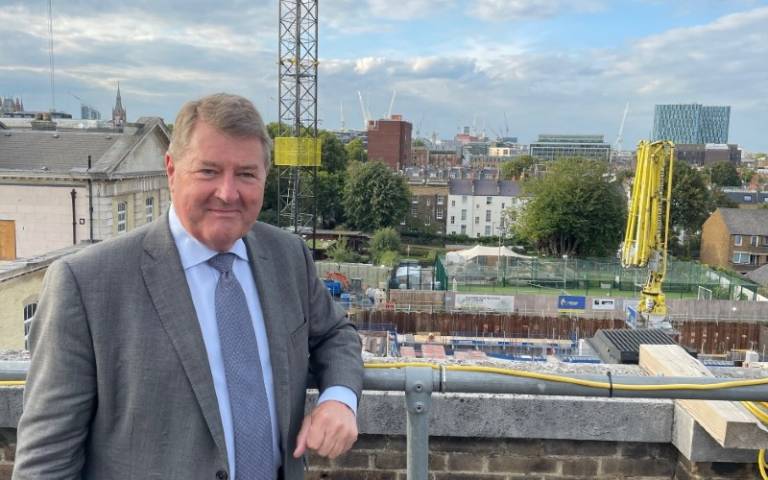Professor Alan Thompson is the ION-DRI project Programme Sponsor. He talks to us about how the project has developed over the last decade
Alan Thompson is the ION-DRI project Programme Sponsor. He is Garfield Weston Professor of Clinical Neurology & Neurorehabilitation and Dean of the UCL Faculty of Brain Sciences.

As Programme Sponsor, I’m ultimately responsible for the project, as well as leading, guiding and championing it for UCL – working closely with key teams including estates, Martin Treacy, David Howard and colleagues, Geoff Dunk as Faculty Director of Operations, Queen Square Institute of Neurology, led by Mike Hanna, Hélène Crutzen and Gipi Schiavo, UK DRI – Bart de Strooper, Adrian Ivinson and UCLH led by John Duncan and Max Tolhurst.
I've been involved from the very beginning, since I became Dean of the Faculty of Brain Sciences, 11 years ago. From the original plan to put up a new building in the goods yard of Queen Square to now, it has been an extraordinarily complex, ambitious and exciting project. Neurology has moved on hugely in the last ten years. In the past, people used to talk about neurological conditions as something you could diagnose, but that there wasn't much you could do for those affected. But in the last decade, opportunities have arisen that we would never have thought of before. A huge amount of basic laboratory work has started to translate into new treatments for patients and the development of translational neuroscience is now a very active dynamic area. There’s a vast number of treatments and potential for many more. There was a real need at the Institute to develop this area further, both in expanding our facilities and our equipment.
And then five years ago, this work coincided with our dementia initiative. The Provost Michael Arthur and I went to 10 Downing Street to begin to canvas for a UK Dementia Research Institute. We felt that we needed to bring everybody together nationally. The Medical Research Council announced it would fund it, with Bart De Strooper appointed as director. He chose UCL to be the UK hub for Centre for the Dementia Research Institute and so the idea of a combined building that housed both the Dementia Research Institute and Institute of Neurology basic/translational work was a fantastic marriage of two exciting complementary initiatives.
“Neuroscience is moving into a very active therapeutic phase, and this new building will drive that forward, accelerate it and catalyse it.
Neuroscience is moving into a very active therapeutic phase, and this new building will drive that forward, accelerate it and catalyse it. The recent news around lecanamab - the first effective treatment for dementia treatment- means we’ll no longer think of dementia as an untreatable condition. It’s based on the amyloid hypothesis, developed by John Hardy some 20 years ago. But there are many, other conditions that are in urgent need of a breakthrough . Multiple Sclerosis has had a number breakthroughs and I've had the privilege to be part of those, and it's been wonderful. Motor Neuron disease or ALS has still to have that kind of breakthrough. Parkinson's has had advances, but desperately needs more, and for dementia, lecnamab is just the beginning.
In the new building, I'm looking forward to seeing people working together from different disease groups, learning from each other, learning across the disease group and benefiting from each other’s successes. I think it will be a challenge, at first for the researchers to work in a different way, but it will settle and go from strength to strength. I’m looking forward to seeing some real developments and new treatments emerging.
“The road between Grays Inn Road and Queen Square will become an intellectual thoroughfare which will enable interesting and impactful advances.
I’m also looking forward to the formation of the dual hub – the new building at Grays Inn Road with Queen Square. There will be nowhere like it in Europe. My hope is to have a forward-and-back flow of staff; of thinking; of students, between the two sites - to have our young people, postgraduate researchers, as well as undergraduates moving across both sites. The road between Grays Inn Road and Queen Square will become an intellectual thoroughfare which will enable interesting and impactful advances. It will be challenging but when it happens, it'll be fantastic.
 Close
Close

